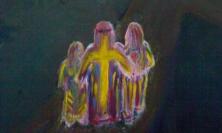Receiving counsel as a gift of the Holy Spirit is not a matter of simply being advised, or even instructed, what to do in any given situation. Counsel finds its partner in discernment, and the way in which they combine to help us make good choices is a process that found concrete expression on the road to Emmaus, says Teresa White FCJ.
According to Dietrich Bonhoeffer, a blessing is ‘the visible, perceptible, effective proximity of God’. In the light of these words, I like to think that perhaps one of the blessings of this time of pandemic is that it has given us time, in closeness to God, to catch up with ourselves, to arrive at where we are in the fast-moving story of our lives, to rethink our priorities and seek the deeper meaning in some of the things we see happening in our world today. Keenly aware that we need help in these strange times, we would do well to pray for the gift of counsel, for the light and guidance of the Holy Spirit. Something of our deeper selves responds to the presence of the Spirit within us, and in these long months of anxiety and heartache, perhaps we have become more aware of the providence that shapes and guides our lives, more aware of the mystery of life, more sensitive to God’s presence. ‘Let anyone who has ears to hear, listen to what the Spirit is saying …’ (Apocalypse 2:29).
Human personhood creates and relies upon conversation and communication to convey meaning. We ‘speak’ to God in prayer, and by the same token, we relate to God as a speaker who can strike chords in us, touch us, encourage us, and whose silence sometimes baffles us. But God’s language is not confined to the sounds of human speech that we call words, or to their written representation. God also speaks to us wordlessly, in what Philip Larkin calls ‘unignorable silence’, and in the good, the bad and the ugly things we all encounter on the journey through life. God, the psalmist says, is ‘my counsellor … who instructs me’ (Ps. 16:7). If we are to hear God’s word in our lives and to feel God’s proximity in the events of the world that is our home, we need to open our hearts and minds to receive the Spirit’s gift of counsel, the third of the seven gifts listed in Isaiah 11:2.
Counsel has a companion, discernment, and through these two gifts we come to see more clearly how to live, how to act. There are choices to be made, and in order to make the better choice, we are invited to listen, to be attentive to the voice of God directing our hearts, speaking in our lives. As people of faith, we want to follow the guidance of the Spirit, and it is through discernment that we become more aware of what helps us to live in accordance with God’s desires for our good. Through counsel and discernment, we seek to follow God’s ways. In troubled times, when we feel we are drifting in the wilderness, when we do not even know what we should pray for, ‘the Spirit comes to help us in our weakness’ (Romans 8:26).
The word ‘Paraclete’ brings together these two gifts: counsel and discernment, guidance and enlightenment. Gerard Manley Hopkins says that often the word is translated as ‘comforter’, but he insists that a Paraclete is more than a comforter:
The word is Greek; there is no one English word for it and no one Latin word. Comforter is not enough. A Paraclete is one who comforts, who cheers, who encourages, who persuades, who exhorts, who stirs up, who urges forward, who calls on; what the spur and word of command is to a horse, what clapping of hands is to a speaker, what a trumpet is to a soldier, that a Paraclete is to the soul: one who calls us on, that is what it means, a Paraclete is one who calls us on to good… Christ was the first Paraclete, the Holy Ghost the second… the Paraclete cheered them [the disciples] not like Christ by his example from without, but by his presence, his power, his breath and fire and inspiration from within; not by drawing but by driving; not by shewing them what to do but by himself within them doing it.[i]
Counsel is the gift by which the Holy Spirit gives us guidance, and at the same time, invites us to make good choices, and we do this through discernment. So, in practice, counsel and discernment are inseparable, two sides of the same coin. Sometimes, our friends, seeing us in trouble, think they know what would be good for us: they want to ‘counsel’ us, to tell us what we could or should do if we are to improve matters. They may do this for the best of reasons: to show sympathy and support, to help us move forward. But if they simply thrust their advice before us – ‘do this, don’t do that’ – what they say will rarely help us. Only if we are open and ready to listen and to engage with them will they find themselves able to give good counsel and we find ourselves able to follow it. This is borne out in the story of the journey to Emmaus, which is a wonderful example of the interweaving of counsel and discernment in the lives of believers.
Luke’s account is strikingly vivid[ii]. It is the day of the resurrection, and Cleopas and his companion are on the road, determinedly leaving Jerusalem, deeply saddened by all that has happened in that place of unspeakable suffering and torment. As they walk their faces are downcast and Jesus, knowing how important it is to understand exactly where the shoe rubs, joins them, walks with them so that he can feel their hurt. This is not the moment for outright ‘counsel’, for saying to these two hurting disciples: ‘Do this or that, and all will be well.’ Nor does he immediately give them straight answers to their questions, knowing that this would not be helpful to them in their state of hopeless bewilderment. Instead, through dialogue, he encourages them to discover for themselves the path they must take. By his words and by his presence with them, Jesus guided and enlightened them: ‘Their eyes were opened … and they set out that instant and returned to Jerusalem’. The gift of counsel led them, through discernment, to make the better choice, and enabled them to move from sorrow to joy.
A hymn called ‘I Saw the Grass’[iii], once popular in some circles but rarely heard nowadays, offers a kind of imaginative contemplation on the cure of the man born blind, as recounted in John 9. The hymn illustrates how this man, who has just received his sight, also receives the dual gifts of counsel and discernment. In the first verse, he looks at the people and things that surround him, rejoicing to see with his own eyes, for the first time in his life, many things that he had only ‘sensed’ before. He looks intently at everything, the grass, the trees, the boats along the shore of the lake. But it isn’t long before disillusionment sets in, for as men and women pass him in the crowded streets, he sees anger, greed and hate in their eyes. To him, these people look disagreeable and unattractive, so, in the second verse, he hurries away from them to the pool of Siloam, where, to complete the cure, Jesus had counselled him to go and wash. Looking into that ‘clear unruffled pool’, the man sees a mirror image of himself. It is a moment of truth: seeing the same anger and hate in his own eyes, he realises he is no different from the people he had run away from. So he decides to go back to the town, and he mingles with the crowds there. The people are just the same as they were before, but now his spiritual eyes have been opened, and he sees faces marked by sorrow, anxiety and fear. The expression in the eyes of these folk discloses the ‘child’ within, the longing for kindness and understanding, and, in the final verse of the song, he turns to them in love. He does this because he knows that this is the way Jesus looks at people, for he had himself experienced that gaze of love. Through the gift of counsel, by listening to Jesus and taking on his perspective, this man has moved from physical blindness to physical sight, and from spiritual myopia to spiritual discernment.
As the pandemic continues, we need the gifts of counsel and discernment to show us the way that leads to healing, and to sense God’s nearness in all that is happening in our world. There are challenges to confront and choices to be made. We need the Spirit to reveal the deeper values by which, in our heart of hearts, we truly want to live, and to lift us from the fears of today to the hopes of tomorrow. In the midst of the darkness that surrounds us, the gift of counsel is a blessing beyond price. ‘O that today you would listen to God’s voice; harden not your hearts.’ (Ps 95:8)
Sister Teresa White belongs to the Faithful Companions of Jesus. A former teacher, she spent many years in the ministry of spirituality at Katherine House, a retreat and conference centre run by her congregation in Salford.
[i] Gerard Manley Hopkins, from a sermon preached in Liverpool on 25 April 1882.
[ii] Luke 24:13-35
[iii] Words and music by Estelle White. See, for example: https://www.youtube.com/watch?v=bymzUcfb1RE






